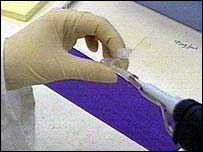The journal Circulation, which deals with the heart and blood circulation, reports how they used a virus to inject a gene into cells taken from a person suffering from congestive heart failure. After the treatment the cells were able to contract at full strength.
Avi Blizovsky

Scientists have been able to use gene therapy to repair damage in human heart cells in the laboratory. The researchers from Thomas Jefferson University hope that before long it will be possible to try the technique on patients with heart defects.
The journal Circulation, which deals with the heart and blood circulation, reports how they used a virus to inject a gene into cells taken from a person suffering from congestive heart failure. After the treatment the cells were able to contract at full strength.
The Jefferson University team is excited that their work represents the first time gene therapy has been successfully used to repair human heart cells, while other work has focused on animal cells.
The gene therapy process fulfills its purpose by blocking the action of an enzyme called beta-adrenergic kinase. The enzyme plays a key role in helping to regulate the heartbeat. However, it can also cause problems, as it happens in people with heart failure, when its level is higher than normal. In such a case, too many receptors in the heart stop working and the whole organ cannot pump with the force it should pump the blood with. The gene therapy process produced a peptide called beta-Arkct that blocks the action of the enzyme.
The lead researcher, Walter Koch said: "This is the first work in real human cells that shows its effectiveness
beta-Arkct as a potential and more important means of healing, we proved that the beta-Arkct enzyme 1 is the target for heart failure treatments.
Prof. Sir Charles George, medical director of the British Heart Foundation, warned that there are big differences between laboratory experiments and patient treatments. "Although the study is interesting in that it explains some of the changes that occur in a failing heart, the work was done in isolated cells in the laboratory. The effect of the treatment on patients is still unknown, because gene therapy has so far mainly produced short-term benefits in animals and living humans.
For news at the BBC
He knew genetic medicine
https://www.hayadan.org.il/BuildaGate4/general2/data_card.php?Cat=~~~812727742~~~25&SiteName=hayadan
